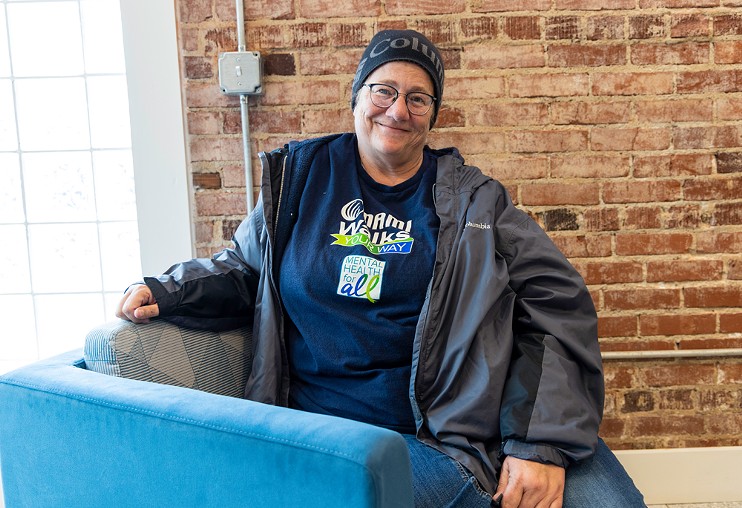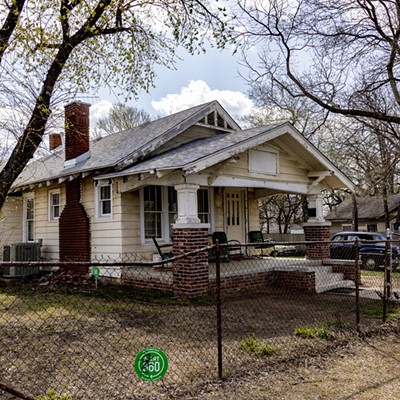“I’m just a mom. Not a nonprofit or anything like that. I’m just a mom,” Charla Collins said.
Charla’s daughter Kylie lives with severe mental illness. After suffering a traumatic brain injury in her teens she eventually turned to drugs, and with little resources available to get her the long term mental health care she needs, she often disappears into the streets, going long periods without contact. During a particular instance in 2021, Charla went out to look for her.
“When I first went into the encampments, I was scared to death,” Collins said. “I just went tent to tent, knocking and asking, showing people pictures of my kid going, ‘Hey, have you seen this girl?’ During that time, I met a lot of people, and I just started connecting with them. It changed my mindset of how I look at people and my beliefs about the homeless. I started a page called See Me OKC with the whole purpose of giving back to the homeless community because, truly, they're the reason I found my daughter.”
Since its inception little more than a year ago, See Me OKC has allowed Charla to help countless families find their loved ones. She spends her time networking with other homeless outreach groups and local mental health facilities and, by going out and searching for people on her own, sometimes placing herself into potentially dangerous situations to find them and get them help.
“I've lost count of how many families I've helped,” Collins said. “We have roughly 768 missing people in the state of Oklahoma right now. Media has led us astray, that there's this team of people to descend from the sky and help you locate your missing loved one. There's no one. It's literally you and whatever support system you have built in place. So I provide a place where people can share about their missing loved one and I try to help them as best I can. I've done a few blogs and I’m able to help people with practical guides, if you will.”
Her personal experiences with her daughter and the people she’s come in contact with have helped shape her understanding of the harsh realities of mental illness, drug addiction and homelessness, its effects on family members and the many struggles they face.
“Many people don't realize how much mental illness there is in our unsheltered community. With some of the illnesses like Parkinson's, dementia or some of these other debilitating brain disorders, people kind of have a picture. But when you say schizoaffective disorder, schizophrenia or bipolar disorder, or even PTSD, they don't have a picture of what this actually looks like and how it affects people and their families, or why they might have turned to the streets. Part of that is because there’s not enough beds in the facilities we do have. Even if you are lucky and you find a bed, providers are not keeping people long enough. They're barely there long enough to call them stable and kick them back out to the streets or they just walk out. Then lies the other problem where families are told [to enroll them in] 12-steps and let them kind of hit bottom, or you're enabling if you're helping them. As a family member, you get a lot of mixed messages and trying to sort through that and figure out what's best for your family and what you need to do. It can be really hard. When I'm not out being a social justice warrior, I am raising my two grandsons because my daughter is still far from stable. A lot of families look like this.”
Charla sees the limitations of the state’s mental healthcare system which often allows people to slip through the cracks. Short on both beds and facilities, many available services are optional and those with more severe disorders often refuse care, remaining in the cycle of addiction and homelessness. Those who do want the services often find themselves facing many hurdles to get care.
“The sad reality is, on a regular basis, I'll have someone that'll tell me they're suicidal. It just breaks my heart. Because in my mind, I'm running through all the options, like what am I going to tell them? I've called 988 for the homeless, I’ve called an ambulance, I've called 911 and I see the response we get and it's often close to nothing. Griffin [Memorial Hospital] has a 15-month waitlist. Like when my daughter was missing, and I would find her. Well what am I supposed to do with her? She was in psychosis, I couldn’t bring her home,” Collins said.
She hopes to see those responses change and more services become available. When she’s not focused on outreach of her own, Charla volunteers with the National Alliance on Mental Illness of Oklahoma (NAMI), where her work recently led to her being named a Volunteer of the Year. Despite the sometimes tragic nature of the work, she finds it very rewarding to help reconnect families and see people recover.
“It's important to me to make a connection with these people,” Collins said. “I ask them to tell me their story, because I truly want to know. Once you can get past the stubbornness and get them to talk to you, you find a lot of unmet grief. A lot of people still hurt, from whoever died, whatever happened, and they're really stuck not knowing how to move on, like their compass is broken. then there's the mental health side of it. There's a small percentage that turned to drugs and alcohol as a way to cope with it, but that's not a majority. It's so complex and there are so many different layers. It's hard to attack. But then, really, we can’t attack until we have a solution.”
Charla hopes to see attitudes towards the homeless continue to change as more people become educated on the nuances of mental illness.
“A big part of my mission is helping people get the right information to help remove the stigma. One of the questions I always get is, ‘How do you know if someone's homeless? You see those people on the off ramp and they're begging for change. How do you know? We don't want to enable because that's bad, right? So how do we help people and not enable them?’ What I've learned is, no matter how nice their clothes are or not, how dirty or not, there can always be an explanation for any of it. So in good conscience, we just give. With no judgment, we meet the people where they're at and let God sort it out. It's not really something that we should have to worry about. So if you have to think too long at that light, just don't do it. But if you want to truly make a difference in our community, just do it.”
Learn more about Charla and her mission at facebook.com/seemeokc.












